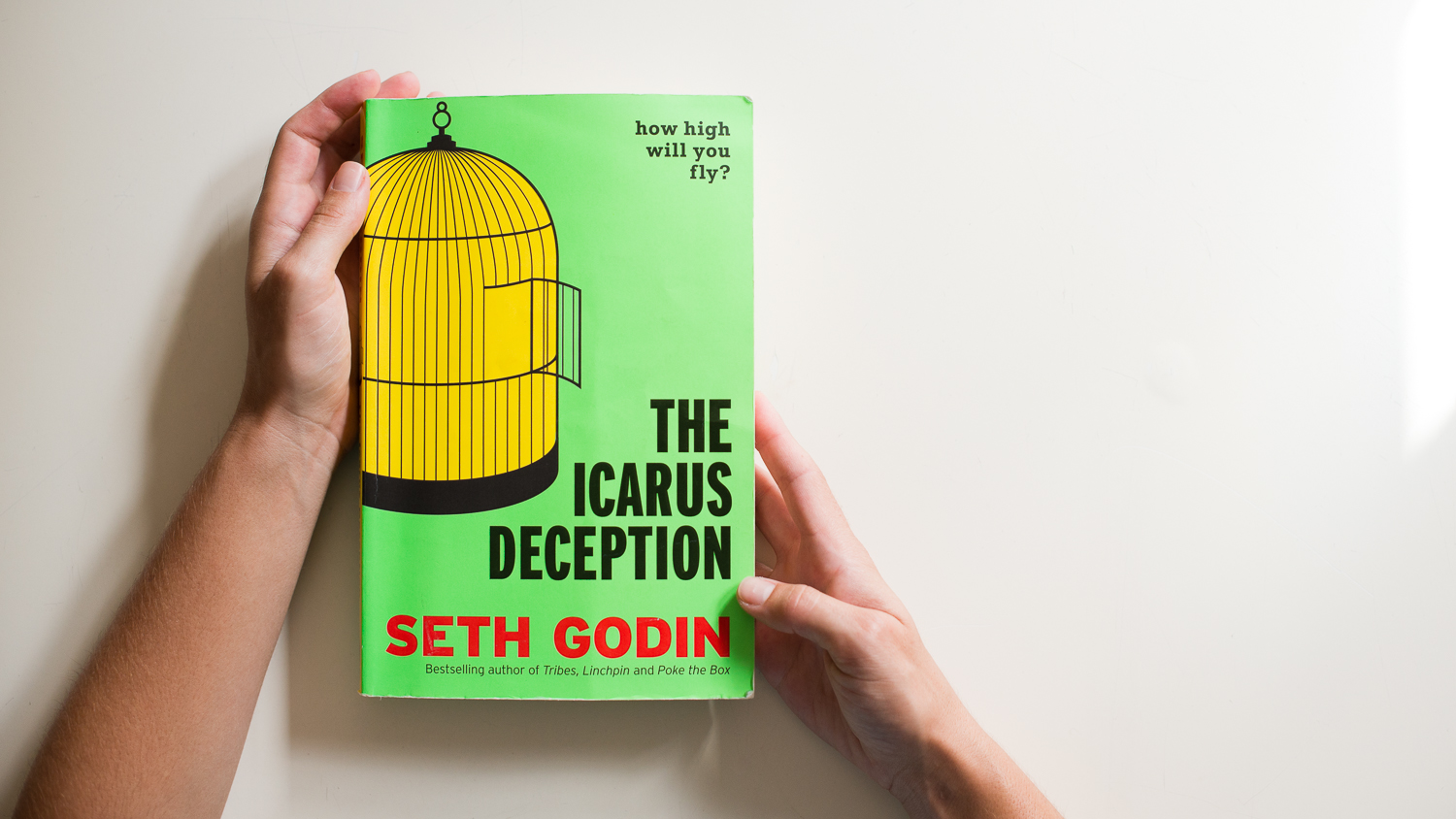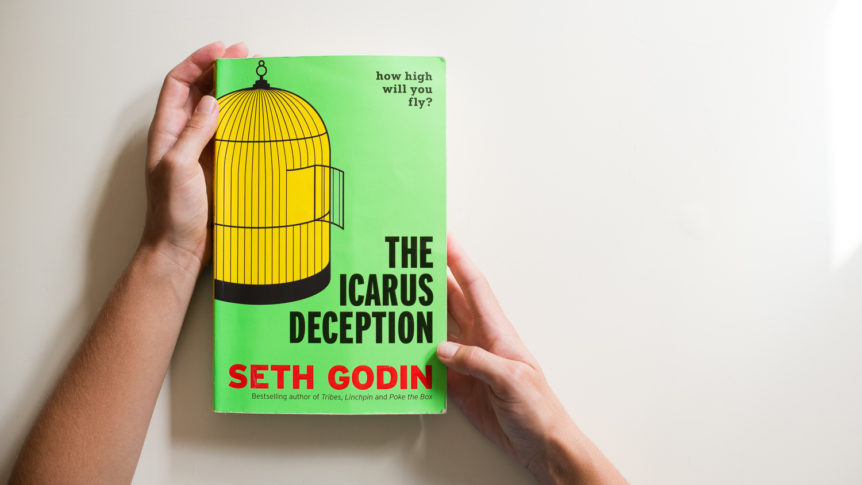
If you’re familiar with Seth Godin’s writing and overall mentality, you know that — through his powerful and clever words — he makes you feel like you can conquer any and every adversity that’s ever weaseled its way into your head or heart. And if you don’t, well, you’re just not living life to the fullest. Word to your mother, Mr. Godin. Thank you for being so severe that we can’t wiggle away from ourselves. Somewhere in the middle of The Icarus Deception, Godin says, “What I’m hoping I might do is get under your skin enough that you’ll ask yourself some hard questions about why you’re not achieving as much as you would like (and why you’re not as happy as you’d like to be).” Mission accomplished.
First order of business: Who’s Icarus? In Greek Mythology, Icarus’s father, Daedalus, created a set of wings (made of feathers and wax) for himself and Icarus, so they could escape Crete. Daedalus warned Icarus not to fly too high or too low. We mostly remember the part about Icarus letting his hubris (self-confidence) get the best of him. Entranced by his ability to fly, he flies too high, too close to the sun and ends up melting his wings, falls to the sea and dies.
Godin says we’re consistently warned not to fly too high. But what about flying too low? Is that really a better option? Complacency. Settling. “Sit quietly, do what you’re told, and perhaps, one day, you’ll get out of the debt and be a winner.” No thanks.
And maybe you’re currently killing it at work. Maybe you are your boss’s righthand (wo)man. You’re smashing it for their success and happiness. But what about your success? What about your happiness? “Just because you’re winning a game doesn’t mean it’s a good game.” Yes, it’s frightening to break free from the cookie-cutter mold. I mean, cookies are one of the best comfort foods. Am I right? And maybe you’re currently killing it at work. Maybe you are your boss’s righthand (wo)man. You’re smashing it for their success and happiness. But what about your success? What about your happiness? “Just because you’re winning a game doesn’t mean it’s a good game.”
Okay, so it’s time to break free. It’s scary business. But guess what, it was (and still is!) scary for anyone that’s done it. “All of those people who you say are your artistic heroes…All of those people who have made such a difference in the world…None of those people were ordained. None of those people were pre-approved,” Godin reminds us.
Godin wants to know: How high will you fly?
Well, that’s up to you. That’s up to the ruckus you want to ensue. “We can be as safe as possible and it’s not going to generate growth, it’s not going to take advantage of the myriad connections we can now make, and it’s certainly not going to benefit you.” It’s up to you to share your passion and talent. It’s up to you to leverage your network to increase your impact, says Godin. We have a big, fat open door. Just waiting for us to connect, to grow, to influence. It’s called the Internet.
Whether we intend to or not, what we say and how we interact with anyone and everyone we meet, will somehow affect them. Godin says the only questions are: “How will they be different” and “How different will they be?” Every interaction gives us an opportunity to disappoint someone OR exceed their expectations. Of course, we all want to exceed the expectations of our clients/customers. “It’s easy to market and manipulate your way into the quick smile or the Broadway-theater obligatory standing ovation. What’s more difficult is to do the less-congratulated work of getting under someone’s skin, of changing the conversation, and of being missed when you’re gone.”
Godin says we need to dig deeper and invest in long-term connection, through our art. We must be genuine. We must get real with ourselves before we can expect anyone to really take us seriously. We must withdraw ourselves from the popularity contest and stand up for what we believe in. Create art and conversation that is meaningful. There will be naysayers and critics. Fear will pound at our doors. But Godin says, in this connection economy, in which we live, “it’s the person who doesn’t enter the arena who is punished…We’ve greatly exaggerated the risk of sinking, without celebrating the value of swimming.”
So, we must connect. There are endless opportunities for us to connect and influence online.
Here’s a good place to start:
- Who do you want to connect with?
- How can you make art and/or conversation that will connect with those people/groups?
- What problems can you solve publicly?
- What is your mission?
- Who can you add to your tribe along the way, as you make progress on your mission?
- How can you encourage others in their missions?
- What forums or groups can you get involved in?
- Who would benefit from you reassuring them?
“We built this world for you. Not so you would watch more online videos, keep up on your feeds, and LOL with your high school friends. We built it so you could do what you’re capable of. Without apology and without excuse. Go.”
Read the book! As with any of our book reviews and summaries, they are not replacements for reading the book yourself. You can get it here.


